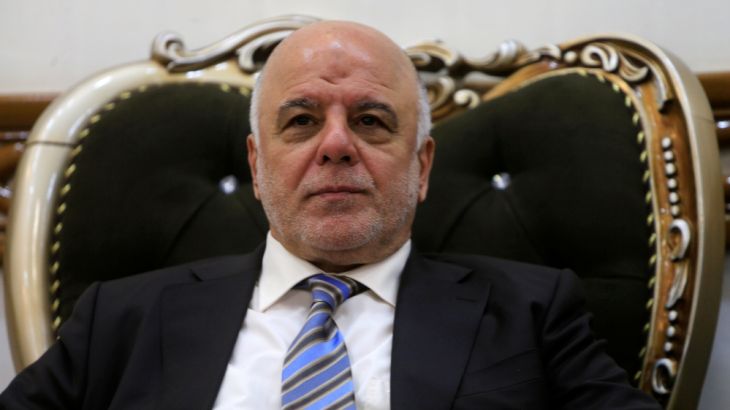In Basra, PM Abadi condemns ‘unacceptable’ Iran consulate attack
Protests demanding jobs and an end to corruption broke out in July in Basra before spreading to other parts of Iraq.

Iraqi Prime Minister Haider al-Abadi has tried to ease tensions in the country’s oil-rich south with a visit to Basra, a province rocked by deadly protests over alleged corruption and government neglect.
Abadi met on Monday with officials and tribal leaders in the provincial capital, Basra, where calm has returned after 12 protesters were killed and many city institutions were torched last week.
For five days, protesters had flooded the streets, clashing with security forces and torching the provincial headquarters, the Iranian consulate and the offices of armed groups.
Organisers have attempted to dissociate themselves from the violence and called for a halt in demonstrations.
Abadi kept his statements in Basra to a minimum.
|
|
“Attacking a consulate or diplomatic post is unacceptable,” he said, in comments carried out by state broadcaster Al-Iraqiya.
Protesters on Friday stormed Iran’s fortified consulate, burning documents and equipment left behind by fleeing employees, none of whom were hurt, according to a consular spokesman.
Bahram Ghassemi, Iran’s foreign ministry spokesperson, denounced the incident as a “savage attack”, according to Iranian news agency Fars.
Iran is a key power broker in neighbouring Iraq and many of the militias and political parties whose offices were torched in last week’s unrest are known to be close to the Islamic Republic.
No security, no services
Basra has been at the epicentre of protests that broke out in July before spreading to other parts of the country, as demonstrators demanded jobs and rallied against high-level corruption.
Anger in Basra flared over a growing health crisis after more than 30,000 people were hospitalised by pollution in the city’s water supply.
There are concerns sustained violence could also disrupt oil production in Basra, home to 70 percent of Iraq’s petroleum reserves, and at the country’s main seaport of Umm Qasr.
“We have a treasure trove of oil beneath our feet, so how is it possible we don’t have drinking water?” said Zein al-Abedein Abdullah, a 19-year-old being treated at the overcrowded Sadr Hospital after the simple act of brushing his teeth with tap water at home.
A combination of natural and manmade factors has created the crisis, shrinking the network of waterways that made Basra the “Venice of the East,” and also diminishing the Tigris and Euphrates rivers, which nourished civilisations since antiquity and made Iraq known as the “Land Between the Two Rivers.”
Streams and canals have become clogged with trash from dumping. A drop in seasonal rainfall, the use of upstream dams in Turkey, Syria and Iran, and a general crumbling of the country’s infrastructure all have contributed to the acute lack of fresh water.
|
|
Armed group, white vans
Rights groups have accused security forces of using excessive force over the death of 12 protesters.
Officials have blamed the deaths and violence on “vandals” who infiltrated the demonstrators.
“There can be no public services without security,” Abadi said during his visit, according to state TV.
But the prime minister has struggled to defuse the anger.
In July, authorities had already pledged a multibillion-dollar emergency plan to revive infrastructure and services in southern Iraq following the first wave of protests.
On Saturday, his government announced it would allocate an unspecified amount of extra funds for Basra.
But demonstrators were unimpressed, saying the billions of dollars pledged in July have failed to materialise.
Al Jazeera’s Rob Matheson, reporting from Iraq’s capital, Baghdad, said Abadi’s visit may not achieve much, adding there were rumours on the streets of Basra of protests breaking out again.
“There is a heavy security presence in Basra and now there’s an armed group that has been parading through the city in white vans, one of those whose buildings were burned last week,” said Matheson in reference to the Hashd al-Shaabi.
“The combination of a heavy security presence and an armed group is likely to raise tension even further.”
|
|